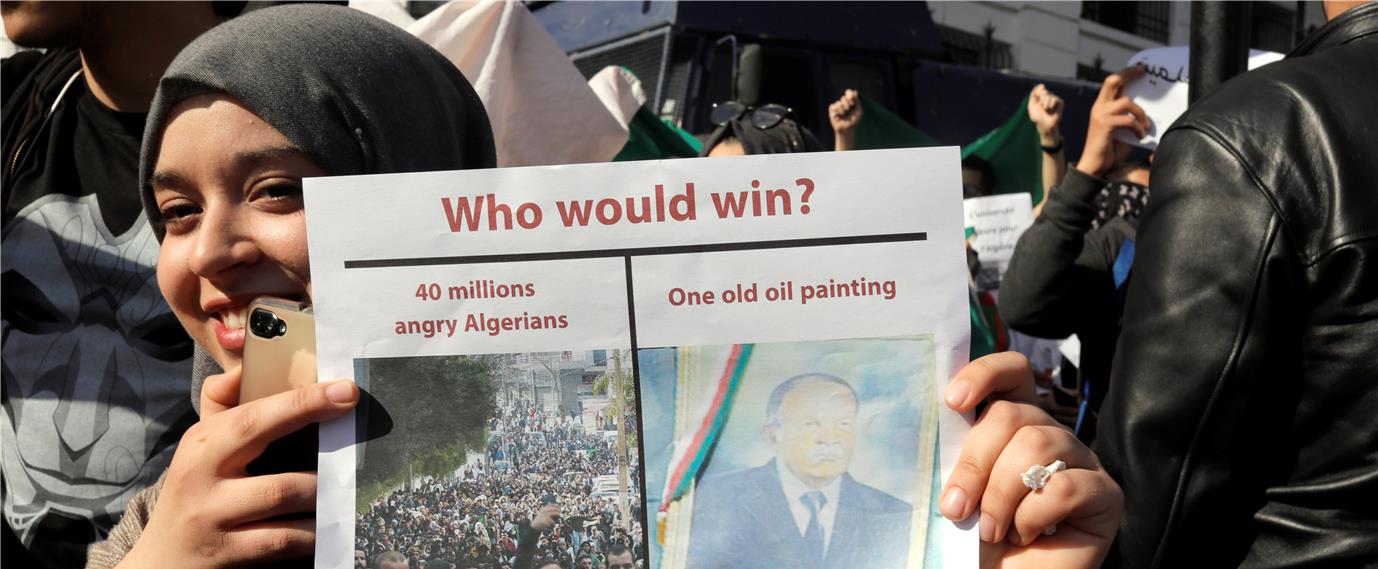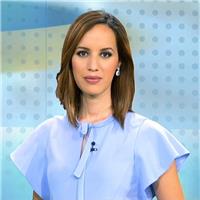تطغى الأحداث الحالية في الجزائر على تغطية وسائل الإعلام العربية والدولية، خاصة بعد "استجابة" الرئيس عبد العزيز بوتفليقة لمطالب المسيرات الحاشدة بسحب ترشحه لعهدة خامسة. تناولُ شخصِ بوتفليقة شكّل تحدياً ضمنياً لوسائل الإعلام حتى قبل المظاهرات الحالية. شخص مقعد، مريض، ندر ظهوره منذ إصابته بجلطة دماغية إلى أن غاب عن الأنظار تماما في الفترة الأخيرة، حتى بدأ إطارُ صورته يعوضه في مناسبات عامة!
لا توجد معلومات دقيقة حول الحالة الصحية لعبد العزيز بوتفليقة، لكنها سيئة لدرجة أن الحديث عنه في السنوات الأخيرة أصبح مقترنا إما بنِكَات على مواقع التواصل الاجتماعي حول صموده أمام المرض، أو الشائعات حول وفاته. وأحيانا وفي عزّ الحديث عن متاعبه الصحية في مستشفيات سويسرا، يُطل علينا فجأة هذا الرجل العاجز من خلال أخبار نشرات مختلف القنوات العربية والعالمية، وهو يعلن ويخاطب ويخطط ويترشح وذلك دون صوت أو صورة! وكأن الأمر يتعلق بشخص آخر...
ذات يوم من العام الماضي وأنا أحضر نشرتي كمذيعة، كان من بين ما احتوته خبرا حول "تأكيد بوتفليقة عزمه ترسيخ علاقات الاحترام مع المغرب، دون الرد على دعوة للعاهل محمد السادس لفتح الحوار وتجاوز الخلافات القائمة بين البلدين...". كان إلى جانبي زميل جزائري وأنا أحضر الخبر، فعلّق قائلا: "بالله عليك، هل تصدقين أنه قادر على صياغة بيان أو إبداء موقف أو حتى التفكير أصلا؟" الجواب طبعا واضح والملاحظة لطالما تبادرت إلى ذهني كلما قرأت تصريحا أو موقفا للرئيس المريض، لكن ما العمل في هذه الحالة؟ دار بيني وبين الزميل نقاش حول ما إذا كان الأصح هو تبني الخبر كما جاء، على اعتبار أنه يعبر في النهاية عن الموقف الرسمي للدولة الجزائرية ورئيسها، بصرف النظر عما إذا كان فعليا موقفه أو موقف جهات أخرى تسير المشهد السياسي في الكواليس، وهو ما لا يمكن، على كل حال، التأكد من حيثياته، أم صياغة الخبر بطريقة أخرى. وفي هذه الحالة يبقى السؤال: ما هي الطريقة المثلى؟
بوتفليقة الحاضر في الإعلام الغائب في الواقع
مع المظاهرات الأخيرة، برز هذا السؤال في ذهني بعدما أصبح "ظهور" الرئيس المريض طاغياً في وسائل الإعلام، يترشّح ويتراجع، كأي سياسي عادي يكافح لإنقاذ مستقبله السياسي في عزّ أزمة حادة تسبق الانتخابات. وانكبت البرامج الحوارية، من كل حدب وصوب، على "قرارات بوتفليقة"، تحللها وتناقش "خطواته" وتطرح السيناريوهات المحتملة، بينما على مواقع التواصل الاجتماعي، الأقربِ إلى الناس وخطابِ الشارع، ساد الانشغال بأسئلة أخرى: هل الرجل في وعيه أصلا؟ أما زال على قيد الحياة؟ هل يعلم بأنه تم ترشيحه؟ ومن يا ترى يكتب عوضا عنه تلك البيانات التي تخرج بها وسائل الإعلام؟؟
لا يوجد عاقل يُصدّق أن بوتفليقة قادر على إصدار قرار أو موقف أو بيان في وضعه الحالي، وبات هناك إجماع على أن بقاءه في السلطة حتى الآن ما هو إلا رغبة جهات معينة في السلطة، لكن رغم كل ذلك تخرج وسائل الإعلام التقليدية "جداً" لتقول إنه قال وفعل وسيفعل. وكأنها لعبة: شخص يتلقى كذبة ويلقيها، وهو يعلم أنها كذلك، والمتلقي يعلم أيضا، لكن الكل متصالح مع الوضع. لربما كان الأمر كله غريبا على وسائل الإعلام الغربية على اعتبار أن التعامل مع رئيس مريض لحد العجز عن الكلام ليس أمرا معتادا لكي تكون قد تكونت خبرة في طريقة التعامل مع وضع كهذا. وربما ليس بالموضوع الهام جدا لها لتغوص وتبحث كبرى وسائل الإعلام في العالم عن منهجية ما في التعامل معه، منهجيةٍ تحترم مهنية الإعلام وذكاء المتلقي.
المعادلة الصعبة أمام الإعلام المهني
أما في العالم العربي، الذي تعتبر الجزائر أكبر بلدانه مساحة، وبكل ثقل هذا البلد وإرثه وأهمية ما يشهده الآن وحضوره في الإعلام، تشغلني كصحفية هذه الأسئلة: هل من الضروري الالتزام بادعاء أن بوتفليقة مازال يحرك شيئا في بلد المليون شهيد وهو غير قادر حتى على تحريك وجهه؟ هل الصواب نقل خبر لا يصدقه أحد، بمن في ذلك الشخص الذي يلقيه، فقط لأن وكالة الأنباء الجزائرية جاءت به ويبقى بذلك الصحفي أو المذيع مجرد وسيلة أو"بوق" يسخره الآخرون بسهولة لينقل ما يريدون أن ينقله؟ أليس هذا مساهمة في دعاية كاذبة مجانية؟ هل العادي هو أن تتصالح الوسيلة الإعلامية مع هذا الوضع "الشاذ"، وتبحث عن صور أرشيفية تضعها في خلفية خبر يقول إن رئيساً يعلن ويفعل شيئا ما الآن، وكأنها تساير من خلقوا هذا الوضع؟ أم أن شخصية الصحفي ومهنية الوسيلة الإعلامية وسمعتها ومبدأ احترام ذكاء المتلقي يتطلب الاجتهاد في مسألة كهذه؟
في هذه الحالة تطرح الإشكالية التالية نفسها: كيف يمكن الحفاظ على التوازن بين عدم الانجرار وراء الموقف الرسمي بحذافيره، وفي نفس الوقت نقل خبر صحيح بحيادية؟ لأنه في نهاية المطاف، صحيح أن لا أحد يصدق أن الرئيس المريض هو من يتخذ القرارات ويعلنها، ومن جهة أخرى لا يمكن الجزم رسمياً بأنّه ليس من يفعل ذلك، بما أن المعطى الوحيد المتوفر بين يدي الصحفي هو البيان الذي تنشره الوكالة الرسمية.
إن كان لي أن أقترح حلولا ما، فسأتجه شخصياً نحو وضع مسافة بين الوسيلة الإعلامية والخبر "المشكوك فيه" تماماً كما جرت عليه العادة عند التعاطي مع معلومات أخرى لسنا متأكدين منها أو لا نريد أن نتبناها، فنقول مثلا بدلا من "أعلن الرئيس الجزائري بوتفليقة في بيان سحب ترشيحه للعهدة الخامسة..." "أعلن بيان قيل إنه صدر عن الرئيس عبد العزيز بوتفليقة نية الأخير سحب ترشيحه للعهدة الخامسة" أو كما اقترح زميلي في نهاية نقاشنا: "أعلنت الرئاسة الجزائرية أن...."
حالة بوتفليقة، والاجتهاد في التعامل معها إعلاميا، قد تبدو للبعض جزئية صغيرة في بحر ما يمكن للإعلام التركيز عليه في الجزائر، لكنها قد تصبح مدخلا لأساليب جديدة يتبناها، في مثل هذه الحالات، الإعلام الذي يريد الاحتفاظ بمهنيته ومصداقيته والبقاء قريباً من متابعيه في عصرنا الذي تقلصت فيه بشكل كبير المسافة بين الإعلام والشارع.














![Palestinian journalists attempt to connect to the internet using their phones in Rafah on the southern Gaza Strip. [Said Khatib/AFP]](/sites/default/files/ajr/2025/34962UB-highres-1705225575%20Large.jpeg)


























